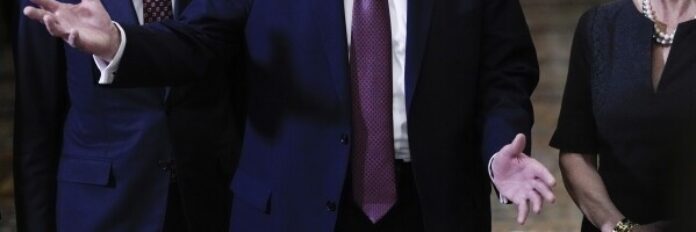
The Biden administration’s acknowledgment of President-elect Donald Trump’s team as “critical” to securing the Israel-Hamas ceasefire deal further highlights the complexity of this historic agreement—and the unusual collaboration between two administrations with diametrically opposed ideologies. In a move rarely seen in U.S. politics, State Department Spokesman Matthew Miller publicly praised the Trump team’s involvement during a Wednesday press briefing, marking a notable moment of bipartisan cooperation amid a deeply divided political climate.
“When it comes to the involvement of President-elect Trump’s team, it has been absolutely critical in getting this deal over the line,” Miller said, underscoring the importance of the incoming administration in ensuring the deal’s implementation.
Miller elaborated that the agreement, which involves multiple phases and delicate negotiations between Israel, Hamas, Egypt, and Qatar, will largely depend on the Trump administration to carry forward its terms. With Biden’s presidency set to expire in five days, Miller emphasized that the United States would play a key role as a guarantor in keeping both sides at the table.
Trump’s incoming Middle East envoy “did more to sway Netanyahu in a single sit-down than outgoing President Joe Biden did all year…” https://t.co/Sbsn45Cw4s pic.twitter.com/GLz667VmG4
— Glenn Greenwald (@ggreenwald) January 15, 2025
The negotiations themselves appear to have been unprecedented in their collaborative structure. According to Miller, both Biden administration officials and Steve Witkoff, Trump’s incoming special envoy to the Middle East, worked side by side to finalize the ceasefire. “I don’t know if it’s unprecedented to have envoys from an outgoing and an incoming administration sitting at the same table negotiating a ceasefire agreement of this kind, but if it’s not unprecedented, it’s certainly unusual,” Miller stated.
Israeli media outlets have reported that Witkoff’s involvement was pivotal in breaking the stalemate. Haaretz correspondent Chaim Levinson noted that Witkoff “forced Israel to accept a plan that Netanyahu had repeatedly rejected over the past half year.” This pressure reportedly helped lock in a deal that had eluded negotiators for months, further demonstrating Trump’s team’s ability to secure commitments where others had failed. Levinson’s reporting supports Biden’s claim that the deal aligns with a framework his administration had developed in May—while also emphasizing that Trump’s team was instrumental in pushing it over the finish line.
Israeli media reports Israel accepted a peace deal because of Trump. The Israeli Right says blames Trump for it. Even anti-Trump outlets in the US (like the NYT) say Trump was a key factor.
Only Biden insists he got it done: a huge coincidence it never happened until Trump won. https://t.co/tGqsUoJAPY
— Glenn Greenwald (@ggreenwald) January 15, 2025
Biden, for his part, was quick to highlight his administration’s role in crafting the deal but only later acknowledged Trump’s team’s involvement. During his press conference, Biden credited figures like Secretary of State Antony Blinken, Vice President Kamala Harris, and National Security Adviser Jake Sullivan for their work before finally noting, “In these past few days, we’ve been speaking as one team.”
The cooperation between the two administrations, while unusual, seems to have been critical to securing the agreement. The deal, which includes a phased ceasefire and the release of hostages, represents a fragile but important step toward de-escalation in the region. However, the credit for its success will likely remain a point of contention, with Biden attempting to frame it as a legacy achievement while Trump’s team asserts its pivotal role in securing the final agreement.








